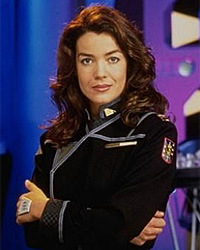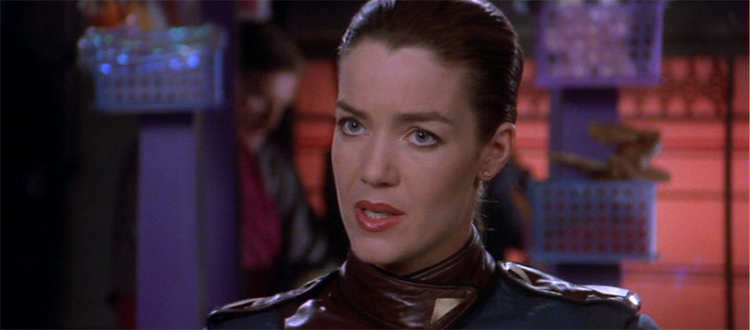Danger Gal Friday: Commander Susan Ivanova
“Who am I? I am Susan Ivanova. Commander. Daughter of Andrei and Sofie Ivanov. I am the right hand of vengeance and the boot that’s going to kick your sorry ass all the way back to Earth. I am death incarnate and the last living thing that you are ever going to see. God sent me!” —Susan Ivanova, Between the Darkness and the Light
 The Babylon 5 TV series provided several strong female characters, but Commander Susan Ivanova out-paced them all. Like Battlestar Galactica’s Kara “Starbuck” Thrace, Ivanova is a tragic figure with much pain in her past. Contrary to Thrace, however, Ivanova has attained a mastery over her pain. She has assimilated it and compartmentalized it, perhaps made some poor decisions based on it, but it does not rule her life overall. Ivanova controls everything: her career, her relationships, and most importantly for the show, Ivanova controls the Babylon 5 station. Patrick over at The Hathor Legacy quotes Ivanova as saying: “When something happens on this station and I don’t know about it, worry.”
The Babylon 5 TV series provided several strong female characters, but Commander Susan Ivanova out-paced them all. Like Battlestar Galactica’s Kara “Starbuck” Thrace, Ivanova is a tragic figure with much pain in her past. Contrary to Thrace, however, Ivanova has attained a mastery over her pain. She has assimilated it and compartmentalized it, perhaps made some poor decisions based on it, but it does not rule her life overall. Ivanova controls everything: her career, her relationships, and most importantly for the show, Ivanova controls the Babylon 5 station. Patrick over at The Hathor Legacy quotes Ivanova as saying: “When something happens on this station and I don’t know about it, worry.”
In light of the feminist bent of the show, it’s sad that I really could only find a few articles on Ivanova to quote from as I have for previous Danger Gal posts. Perhaps the lack of analysis on Ivanova is due to her being such a singular or original character that she doesn’t fit well into any stereotype and so people don’t know how to approach her. So, I conducted an informal poll of a few friends I knew were particularly knowledgeable on B5 and they overwhelmingly characterized Ivanova as competent to a fault and of possessing a multidimensional nature.
Susan Ivanova is many things — a career military officer, female, daughter, bisexual, a Russian Jew, latent telepath — and yet she is not overly defined by any one of these traits, but rather is a three-dimensional character defined equally by all or by the interplay of them.
I find this multi-dimensional approach to character building refreshing. J. Michael Straczynski avoided several common traps in writing female characters. His characters of both genders are portrayed as people first, gender and sexual preference second or even further down on the list. I’m tired of female characters who are defined solely by their gender experience, meaning that they can only ever be or only ever primarily be maidens, mothers, harlots and crones. These are apt archetypes often turned into stereotypes by writers who don’t understand how gender filters human experience. This is a fundamental failing for a writer, who is supposed to be a student of human nature.
The second half of the trap B5 avoided was lesbian or bisexual characters who are portrayed by sub-par writers as anti-woman in that they’re treated as males with boobs — as if being gay were a prerequisite for being kick-ass. Ivanova has had sexual relationships, both gay and straight, and all have been tragic, but none of them have solely directed her fate. Ivanova kicks ass because she has attained the skills required to do that, whether it’s physically, piloting a Fury, or running a space station. Incidentally, both Ivanova’s predecessor and successor were also female: Laurel Takashima and Elizabeth Lockley.
We should all be expecting multidimensional female (and male) characters who, like Ivanova, are complicated people we root for or rally against — due of the sum total of their traits, not one in particular.
[This one’s for Corbie and friends.]

